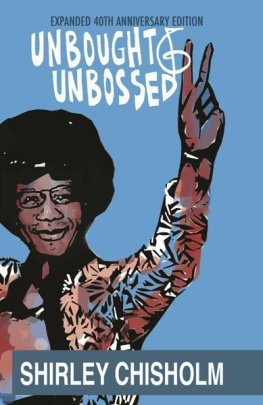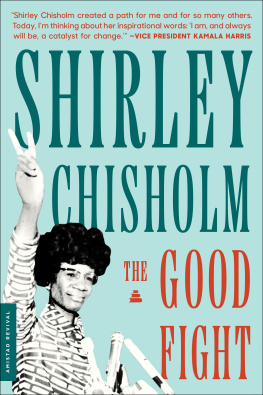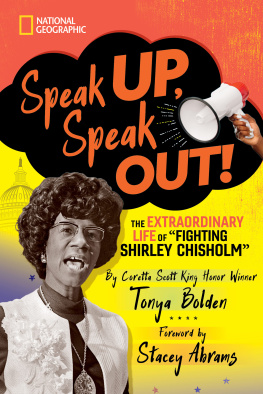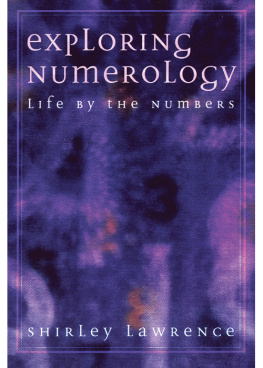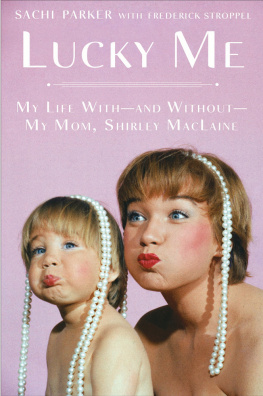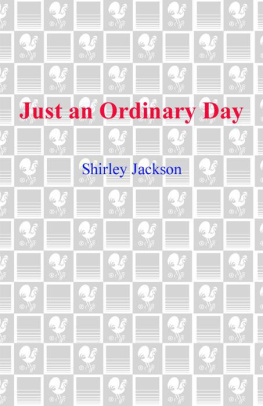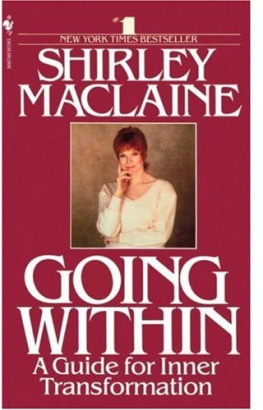Shirley Chisholm
Unbought
And
Unbossed

Washington, D C
To Conrad, for his deep understanding
Grateful acknowledgment for assistance in the preparation of this book is due to Wes ley McD. Holder, for his tireless efforts and loyalty; to Samuel Korb, for his legal assist ance; to my Washington and Brooklyn office staffs; to Lee Hickling, for research and editing aid; to Joan Middleton, for typing the manuscript.
The author is grateful to the editors of The Black Politician for permission to quote from an article by Julian Bond which appeared in the Winter 1969 issue.
The editor offers special thanks to the following contributors to this edition:
The Estate of Shirley Chisholm
Cover Art and Logo Design
Youme Landowne
www.youme.landowne.com
Foreword
Donna Brazile
www.brazile associates.com
Afterword
Shola Lynch
Her Documentary Chisholm72Unbought and Unbossed is Available on DVD
Editing
Ellen Povill
Abigail Williams
Jonathan Ivy Kidd, PhD
Cover Adapted from Photo Taken by Rose Greene
Publishers Logo and F ont Based on the Artwork of Peter Gee
www.petergee.com
Shirley Chisholm
Unbought
And
Unbossed

Washington, DC
Take Root Media Edition, January 20
www.takerootmedia.com
Copyright 1970 by Shirley Chisholm
Foreword Copyright 200 by Donna Brazile
Afterword Copyright 200 by Shola Lynch
Edited by Scott Simpson
All rights reserved. No part of this work may be reproduced or transmitted in any form by any means, electronic or mechanical, including photocopying and recording, or by any information storage or retrieval system, without permission in writing from the publisher.
ISBN: 978-0-9800590-2-1
Printed in the United States of America
Reprint. Originally published: Boston:
Houghton Mifflin, 1970
ISBN: 0-395-10932-9
Contents
Foreword By Donna Brazile X III
Introduction
I
GROWING UP
1 Early Years in Barbados
Back to Brooklyn 30
College Years
Starting in Politics
II
GETTING THERE
Teaching, Marriage, and the Political Arena
In the State Assembly
Running for Congress
Breaking the Rules 95
III
SPEAKING OUT
The Speech Against the War 109
How I View Congress
Facing the Abortion Question
The Lindsay Campaign and Coalition Politics
Black Politicians and the Black Minority
IV
LOOKING AHEAD
A Government That Cannot Hear the People
Women and Their Liberation
Youth and America's Future
Afterword By Shola Lynch
Shirley Chisholm xv
As we welcome this beautiful portrait to the Capitol grounds, we ensure that Shirley Chisholm will indeed long be remembered as a catalyst for change in America. A brave pioneer, Shirley Chisholm was unwilling to settle for the status quo.
The Honorable Speaker Nancy Pelosi (D-California)
FOREWORD
BY
DONNA BRAZILE
That I am a national figure because I was the first person in 192 years to be at once a congressman, black and a woman proves, I think, that our society is not yet either just or free.
Shirley Chisholm
If Shirley Chisholm had done nothing else with her life than earn the right to express all the wisdom, history and irony packed into that one sentence, I would have loved and revered her for that reason alone. But she was a wondrous spirit who said and did so much more. By changing the way America thought about women, minorities, and poor children, she changed the course of our nations history.
In an interview given less than one year before her death in 2005 at the age of 80, Mrs. Chisholm, as I fondly recalled her, spoke of how she wanted to be remembered. I want history to remember me not just as the first black woman to be elected to Congress, not as the first black woman to have made a bid for the presidency of the United States, but as a black woman who lived in the 20th century and dared to be herself. I want to be remembered as a catalyst for change in America.
On March 3, 2009, the 40 th anniversary of Congresswoman Chisholm groundbreaking swearing in as a member of the House of Representatives, House Speaker Nancy Pelosi, Congressional Black Caucus Chairwoman Barbara Lee, and members of the Congressional Black Caucus hosted a ceremony to unveil her official portrait. The painting, appropriately enough, portrays the dynamic Mrs. Chisholm with her arms folded across her chest and her index finger waggingwhether in encouragement or admonishment is left to the conscience of the viewer.
As the first woman speaker of the House, I want to say thank you to Shirley Chisholm, declared Speaker Pelosi during the Cannon Caucus Room ceremony overflowing with hundreds of people that included some of Mrs. Chisholms former colleagues and members of the National Organization of Women, which she co-founded. Reps. Charlie Rangel (D-New York) and John Conyers (D-Michigan), who, with Mrs. Chisholm, were co-founders of the Congressional Black Caucus (CBC), told stories of her courage and tenacity. They recalled how there were only Black members of Congress when Mrs. Chisholm took office and noted that there are now 42, 14 of whom are women, with one former CBC member now the president of the United States of America.
Had Mrs. Chisholm lived long enough to witness the election of Americas first black president, I suspect she would have been unfazed. In many ways, her groundbreaking and historic 1972 presidential campaign helped to pave the way for the election of Barack Obama. Mrs. Chisholm, like President Obama, ran not as a Black candidate but as a leader capable of inspiring a new generation of Americans to take their seats at the proverbial political table. In announcing her bid for president, Mrs. Chisholm declared, "I stand before you today as a candidate for the Democratic nomination for the Presidency of the United States. I am not the candidate of black America, although I am Black and proud. I am not the candidate of the women's movement of this country, although I am a woman, and I am equally proud of that. I am not the candidate of any political bosses or special interests. I am the candidate of the people."
Her bid for the presidency, which garnered 152 delegate votes on the first ballot at the Democratic National Convention, was symbolic and necessary, she said, in spite of hopeless odds... to demonstrate the sheer will and refusal to accept the status quo.
Taking its title from the theme of her first congressional campaign, Mrs. Chisholm wrote Unbought and Unbossed in 1970, a time when there were limited seats available for women and minorities in the electoral arena. She dared to make a difference, and in doing so she took on the status quo of the whiteand, yes, Blackgood ol boy political establishment in Brooklyn, Albany, and Washington until they understood she would never waiver in her attempt to bring about equality for all.
Mrs. Chisholm was ahead of her time. She did not wait for permission and she did not seek the acceptance of those who came before her. She was her own boss, as unpredictable as she was unpretentious. As a young congressional intern in the early 1980s, I had the honor of meeting Mrs. Chisholm before she made the decision to leave politics and enter academia, where she still kept an eye out for young people, especially young women and minorities. But she never really left politics.
Next page
